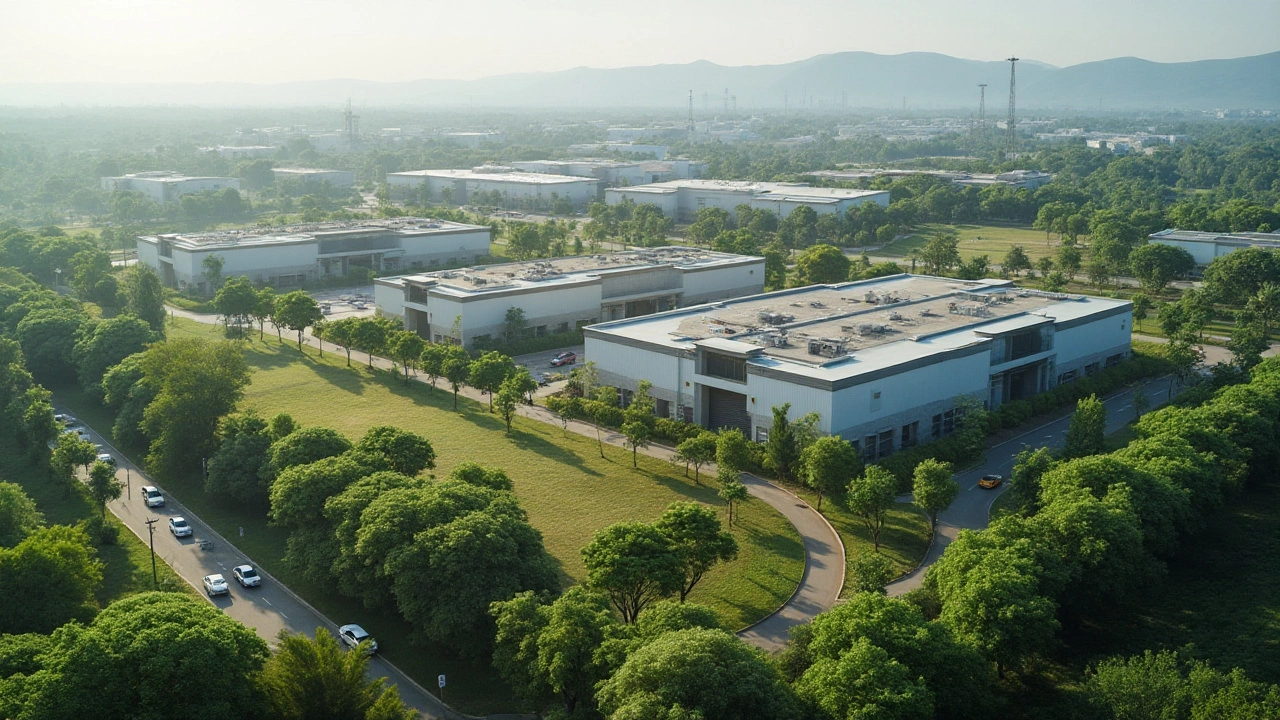Ethiopia's rapid economic growth is a fascinating topic that has garnered global interest. Traditionally known for its rich history and culture, the country is now making headlines for its impressive economic strides. There are several factors fueling this transformation, making Ethiopia a land of opportunity for career seekers and business ventures.
One of the major drivers behind this growth is the massive investment in infrastructure. New roads, railways, and airports are being built, which are crucial for trade and mobility. These projects not only create jobs but also improve the quality of life for Ethiopians.
The Ethiopian government's policies have also played a significant role. By creating an environment conducive to business and removing bureaucratic red tape, they've attracted both local and foreign investors. This influx of investment has stimulated various sectors, including manufacturing, agriculture, and services.
Foreign investments are another cornerstone of Ethiopia's economic boom. With incentives and dedicated industrial parks, the country has become a favorable destination for international businesses. These investments bring much-needed capital and expertise to the local economy.
Last but certainly not least, education reforms are equipping the workforce with the skills needed for modern industries. From vocational training programs to university partnerships, Ethiopia is building a knowledgeable workforce ready to take on challenging roles.
In essence, Ethiopia's rapid economic growth is not a miracle but the result of strategic planning and execution. Whether you're a job seeker or a businessperson, understanding these factors can help you navigate and capitalize on the opportunities this dynamic country offers.
Infrastructure Development
Ethiopia's economic surge is largely driven by its significant infrastructure development. This East African nation has been channeling substantial resources into building and upgrading its infrastructure, transforming the landscape and the economy. A particularly ambitious project is the construction of the Addis Ababa-Djibouti Railway. This modern railway line connects Ethiopia to the Port of Djibouti, facilitating smoother trade and reducing transportation costs. The railway is a game-changer since approximately 90% of Ethiopia’s import and export trade goes through Djibouti.
Another notable infrastructure venture is the expansion of the road network. Ethiopia is in the midst of the Road Sector Development Program, which aims to widen, upgrade, and create thousands of kilometers of roads. Improved roads mean better connectivity between cities and rural areas, stimulating economic activities across the country. This development directly benefits the agricultural sector by making it easier to transport goods to market, thereby boosting incomes for farmers.
Aviation infrastructure hasn't been left behind either. The Ethiopian Airlines, a state-owned enterprise, has become a major player in aviation, not just in Africa but globally. The airline’s hub, Bole International Airport, is undergoing extensive expansion to handle more passengers and cargo. This growth in aviation infrastructure supports not only tourism but also global business connections, creating more job opportunities in Ethiopia.
The government is also investing heavily in energy infrastructure. The Grand Ethiopian Renaissance Dam (GERD) is one of the largest hydroelectric dams in Africa. Once completed, it is expected to produce 6,450 megawatts of electricity, effectively doubling Ethiopia's electricity generation capacity. The availability of reliable and affordable electricity is crucial for industrialization and economic growth.
Additionally, many cities and towns are witnessing a boom in construction projects, including residential buildings, offices, malls, and public spaces. These developments are not just about creating more buildings but also about modernizing the urban landscape, making cities more livable and conducive to business activities.
Dr. Abiy Ahmed, Ethiopia's Prime Minister, stated, "We are committed to transforming Ethiopia through robust infrastructure development. We aim to make Ethiopia a hub for investment and progress in Africa."
These infrastructure projects are creating numerous job opportunities for local workers, engineers, and vendors. They are also laying the groundwork for sustained economic growth. Moreover, improved infrastructure has a multiplier effect on the economy. Jobs created in construction sectors spur demand in various other sectors such as retail, services, and housing.
In summary, the aggressive pursuit of infrastructure development is a cornerstone of Ethiopia’s rapid economic growth. Whether it's through modern railways, expansive road networks, a burgeoning aviation industry, or energy projects, these efforts are collectively enhancing Ethiopia’s economic landscape. This transformation opens the door to numerous career opportunities, making Ethiopia an appealing destination for job seekers and entrepreneurs alike.

Government Policies
One of the key factors behind Ethiopia's impressive economic growth is its proactive and business-friendly government policies. These have been carefully designed to foster a conducive environment for economic activities, cut through bureaucratic red tape, and attract both local and international investments. In recent years, Ethiopia has implemented a series of reforms aimed at liberalizing its economy. These efforts are paying off handsomely as the country witnesses unprecedented growth across various sectors.
Since 2018, Prime Minister Abiy Ahmed's administration has introduced sweeping changes that have revitalized the economy. They've worked tirelessly to privatize some of the state-owned enterprises, opening up industries like telecommunications, aviation, and logistics to private investors. This shift from a state-controlled to a more liberal economic model has injected much-needed dynamism into the market. The move is seen as a significant departure from the past, where state monopolies stymied competition and innovation.
Another notable policy is the creation of industrial parks designed to attract foreign investments. These parks offer numerous incentives, such as tax holidays, streamlined customs procedures, and easy access to infrastructure. The Hawassa Industrial Park, for instance, is a flagship project that specializes in textile and garment production, attracting global brands like PVH and H&M. This park alone has created thousands of jobs for Ethiopians, thus boosting local livelihoods and economic activities.
Moreover, Ethiopia has been actively reducing its trade barriers to integrate better into the global economy. The government has simplified import-export procedures and reduced tariffs on essential goods. This initiative not only makes the Ethiopian market more accessible but also stimulates competitive pricing and a wider range of products for consumers. These measures have been lauded by international organizations such as the World Bank and the International Monetary Fund (IMF).
“Ethiopia’s government policies are increasingly focused on enhancing the country’s business climate and opening up economic opportunities for private and foreign investors,” remarks a World Bank report on the Ethiopian economy.
One of the most commendable steps has been the focus on improving governance and fighting corruption. The Ethiopian government has established the Anti-Corruption Commission to root out corruption and enhance transparency in public institutions. These actions have built greater trust among investors, both domestic and foreign, encouraging them to commit resources to the Ethiopian economy.
The government has also made significant strides in financial sector reforms. By modernizing its banking systems and encouraging digital payment solutions, they are making financial services more accessible to the general populace. This not only stimulates local businesses but also brings more people into the formal economy, thereby increasing tax revenues and public investment capabilities.
Market-oriented agricultural policies are another vital area where Ethiopian government policies have made a considerable impact. Through initiatives like the Agricultural Transformation Agency (ATA), the government is working on improving the agricultural sector, which is a cornerstone of the Ethiopian economy. By introducing new technologies and improving supply chains, they are making agriculture more efficient and profitable.
In essence, Ethiopia's remarkable economic ascent can be attributed to its strategic and well-implemented government policies. These policies have not only improved the business climate but also widened economic opportunities for Ethiopians. As the country continues to liberalize and modernize, it stands as a beacon of growth and opportunity on the African continent, drawing career seekers and investors from all corners of the globe.

Foreign Investments
Foreign investments play a crucial role in the economic landscape of Ethiopia. In recent years, the Ethiopian government has made a concentrated effort to attract international capital, positioning itself as a favorable destination for global investors. This move has borne fruit as a variety of multinational companies have established operations within the country, drawn by lucrative opportunities and investment incentives.
One of the most prominent examples of this phenomenon is the establishment of industrial parks. These dedicated zones, such as the Hawassa Industrial Park, have become hubs for manufacturing and export activities. They provide businesses with essential amenities and infrastructure, effectively cutting down on operational costs and complexities. These parks represent a significant part of Ethiopia's strategy to diversify its economy and create job opportunities for its population.
The government has constructed various incentives to further sweeten the deal for foreign investors. These include tax holidays, customs duty exemptions, and the provision of land at competitive lease rates. Such measures significantly reduce the initial financial burdens for businesses, encouraging them to invest in the country. Additionally, the regulatory framework has been streamlined to facilitate ease of doing business, removing bureaucratic barriers that previously hindered investment.
This influx of foreign investment has had a multiplicative effect on the local economy. Not only does it bring in much-needed capital, but it also introduces advanced technologies and expertise. For instance, companies in the tech sector have established research and development centers in Ethiopia, fostering innovation and skill development among the local workforce. This, in turn, helps the country move up the value chain, creating new career opportunities for its citizens.
"Ethiopia's commitment to reform and openness has made it a preferred destination for foreign direct investment. The impact on the local economy has been overwhelmingly positive," notes an analyst at the African Development Bank.
China has been one of the largest investors in Ethiopia, pouring billions into various sectors including construction, manufacturing, and telecommunications. This partnership has led to the completion of major projects such as the Addis Ababa-Djibouti Railway, which enhances regional trade connectivity. Other countries, including the United States, Turkey, and India, have also invested heavily, diversifying the sources of foreign capital.
There are key sectors that attract the most attention from international investors. Manufacturing is at the forefront, bolstered by Ethiopia's abundant labor force and strategic location. Agriculture is another major sector, with the country being one of the largest producers and exporters of coffee, flowers, and other agricultural products. Investments in these sectors are vital as they not only generate revenue but also create employment for millions of Ethiopians.
As the Ethiopian government continues to roll out reforms and enhance its business environment, the future looks promising for foreign investments. For career seekers in Ethiopia, this means a growing number of job opportunities across various sectors, driven by the continuous infusion of international capital and expertise. Aspiring entrepreneurs also stand to benefit, as increased foreign investment leads to a more dynamic and diversified economy.

Education Reforms
Education reforms are a cornerstone of Ethiopia's rapid economic growth. Transforming an education system is no small feat, and Ethiopia's commitment to doing so has yielded significant positive outcomes. The government has rolled out several policies and initiatives aimed at improving the quality and accessibility of education across the country. These reforms are designed to equip the local workforce with the skills and knowledge necessary for today's job market.
One of the most significant changes is the introduction of compulsory primary education. This policy ensures that every child has the opportunity to receive at least a basic education. As a result, enrollment rates have skyrocketed, leading to a more educated population. Additionally, the government has invested heavily in school infrastructure, building new schools, and refurbishing existing ones to create conducive learning environments.
Teacher training programs have also been implemented to improve the quality of education. These programs are designed to equip teachers with modern teaching methods and pedagogical skills. By enhancing the capabilities of educators, the quality of instruction improves, leading to better student outcomes. Additionally, the government has introduced incentive programs to attract and retain qualified teachers, particularly in rural areas.
Vocational training has become a focal point of the educational reforms. Recognizing the need for a skilled workforce in various industries, Ethiopia has established vocational training centers across the country. These centers offer courses in fields such as manufacturing, agriculture, and information technology, providing students with hands-on experience and practical skills. The emphasis on vocational training aligns with the country's economic goals, as it prepares individuals to fill roles in key sectors.
"Education is the most powerful weapon which you can use to change the world," said Nelson Mandela. This statement holds particularly true for Ethiopia, where educational reforms are driving economic transformation.
Higher education has not been left behind in Ethiopia's education reforms. Universities and colleges have undergone significant transformations, with an emphasis on research and development. Partnerships with international institutions have been established to enhance the quality of higher education and promote the exchange of knowledge. As a result, Ethiopian universities are producing graduates who are well-prepared to contribute to the country's economic development.
The use of technology in education has also been a game-changer. The government has introduced digital learning platforms and e-learning initiatives to enhance access to education. These platforms provide students with access to a wealth of resources and enable remote learning, which is particularly beneficial in rural areas. The integration of technology in education ensures that students are well-versed in digital skills, which are essential in the modern job market.
Education reforms in Ethiopia are not just about improving the quality of education but also about ensuring that education is inclusive. Efforts have been made to bridge the gender gap in education and provide opportunities for marginalized communities. Scholarships and financial aid programs have been introduced to support students from disadvantaged backgrounds, ensuring that everyone has a fair chance at success.
In conclusion, the education reforms in Ethiopia have been instrumental in driving the country's economic growth. By prioritizing education and investing in the future of its citizens, Ethiopia is laying the foundation for a prosperous and sustainable economy. These reforms are opening up new career opportunities and creating a skilled workforce that can compete on a global scale. For anyone looking to build a career in Ethiopia, understanding the impact of these education reforms is essential.

 Discovering Ethiopia's Wealthiest Entrepreneur
Discovering Ethiopia's Wealthiest Entrepreneur
 Ethiopian Jobs: Exploring Livelihoods in Ethiopia
Ethiopian Jobs: Exploring Livelihoods in Ethiopia
 Current Employment Statistics in Ethiopia for 2024
Current Employment Statistics in Ethiopia for 2024
 Making Money on YouTube in Ethiopia: A Practical Guide
Making Money on YouTube in Ethiopia: A Practical Guide
 Discover the Highest Paid Jobs in Ethiopia: An In-Depth Guide
Discover the Highest Paid Jobs in Ethiopia: An In-Depth Guide
Liliana Carranza
October 2, 2024 AT 17:41Wow, Ethiopia's boom feels like an invitation for anyone ready to roll up their sleeves and dive into new opportunities! The railways, the new factories, the surge in tech training… it's like the country is shouting, “Come work with us!” I love seeing how the government’s push for infrastructure is sparking real jobs, and the vibe is totally energizing for fresh grads and seasoned pros alike.
Keep the momentum going, folks!
Jeff Byrd
October 4, 2024 AT 11:21Oh great, another “miracle” story about Ethiopia. As if the roads magically appeared and the jobs just fell out of the sky. Sure, the rail line is cool, but let’s not pretend there isn’t a ton of red tape still lurking somewhere.
Joel Watson
October 6, 2024 AT 05:01The discourse surrounding Ethiopia's economic trajectory necessitates a rigorous appraisal of the empirical data, rather than a perfunctory commendation. While the infrastructural undertakings are ostensibly commendable, one must scrutinize the sustainability indices and fiscal prudence underpinning such endeavors.
Chirag P
October 7, 2024 AT 22:41It’s inspiring to see a nation blend its rich cultural heritage with modern development. The emphasis on education reforms respects traditional values while preparing the youth for a globalized market. This balanced approach can serve as a model for other emerging economies.
RUBEN INGA NUÑEZ
October 9, 2024 AT 16:21Hey everyone, just wanted to point out that the industrial parks aren’t just about brick and mortar-they’re training grounds for a whole new generation of skilled workers. When you combine on‑the‑job learning with vocational courses, you get a workforce that can actually run those factories efficiently.
Michelle Warren
October 11, 2024 AT 10:01nice
Christopher Boles
October 13, 2024 AT 03:41Super exciting stuff! The way Ethiopia is tackling both big‑scale projects and grassroots training is like a double‑header win. If you’re looking for a place to grow your career, this could be the perfect launchpad.
Crystal Novotny
October 14, 2024 AT 21:21Growth is not merely a number; it is the echo of intentions manifesting through steel and syllabus.
Reagan Traphagen
October 16, 2024 AT 15:01Don’t be fooled-there’s a hidden agenda behind all that shiny infrastructure. Who’s really pulling the strings? The global elites don’t hand out railways for free; there’s always a payoff hidden in the shadows.
mark sweeney
October 18, 2024 AT 08:41Well, if you believe everything in the official reports, you might miss the fact that the so‑called “investment boom” could be a temporary surge, not a steady climb. Let’s keep an eye on the long term.
randy mcgrath
October 20, 2024 AT 02:21Thinking about Ethiopia’s progress reminds me of how interconnected the world really is. When one country invests in education, the ripple effects can be felt far beyond its borders, shaping global innovation.
Frankie Mobley
October 21, 2024 AT 20:01From a cultural standpoint, Ethiopia’s openness to foreign partnerships while preserving its identity is a nuanced dance. It shows that development doesn’t have to erase tradition, but can instead celebrate it.
ashli john
October 23, 2024 AT 13:41Really happy to see all these positive changes happening! It feels like a fresh start for many, and the community vibes are strong.
Let’s keep supporting each other.
Kim Chase
October 25, 2024 AT 07:21I think it’s important we recognize the effort put into making these projects inclusive. Different regions get connected, which helps bridge gaps and promote unity across the nation.
David Werner
October 27, 2024 AT 01:01Look, the more you hear about the dam and the rail, the more you have to wonder about the environmental impact and who’s really benefiting from the electricity surge. Something’s off.
Paul KEIL
October 28, 2024 AT 17:41RUBEN makes a solid point about the parks being training grounds. In fact, the Hawassa Industrial Park integrates apprenticeship programs directly into its production lines, allowing trainees to transition smoothly from classroom theory to hands‑on practice without the usual steep learning curve.
Horace Wormely
October 30, 2024 AT 11:21Indeed, the apprenticeship model must adhere to strict compliance standards; any deviation could compromise both product quality and worker safety, which is why rigorous monitoring protocols are essential.
christine mae cotejo
November 1, 2024 AT 05:01When you step back and watch Ethiopia’s economic canvas unfold, the colors are vivid, the strokes bold, and the narrative compelling. The government’s decisive move to de‑bureaucratize investment channels has opened the floodgates for capital that previously lingered in hesitancy. Infrastructure, once a stagnant phrase, now pulses with rails that stitch the country to the Red Sea, highways that slice through once‑isolated valleys, and airports that beckon global commerce with roaring turbines. Electricity, courtesy of the Grand Ethiopian Renaissance Dam, is no longer a fickle promise but a steady river powering factories, schools, and homes alike. Yet, the story does not rest on steel and concrete alone; it is equally forged in classrooms where curricula are overhauled to meet modern demands, in vocational workshops where hands learn the language of machinery, and in universities that now partner with foreign scholars to push research frontiers. The ripple effect is palpable: local entrepreneurs find suppliers and markets they never imagined, farmers transport produce swiftly to bustling urban centers, and young professionals, once resigned to limited prospects, now chart careers in sectors ranging from textiles to tech startups. Moreover, the social fabric tightens as communities reap the benefits of improved mobility, reduced travel times, and a burgeoning middle class that spends on education, health, and culture. This multifaceted growth feeds a virtuous cycle-investment spurs jobs, jobs foster consumer confidence, and confidence attracts further investment, perpetuating the momentum. While challenges remain, such as ensuring equitable resource distribution and safeguarding environmental standards, the trajectory is unmistakably upward. Ethiopia’s resurgence showcases how strategic planning, when married to bold execution, can transform a nation’s destiny and inspire neighboring countries to envision similar paths of prosperity. In essence, the tapestry of progress is woven through deliberate policy, relentless infrastructure development, and an unwavering commitment to human capital. The momentum continues as investors watch and join.
Douglas Gnesda
November 2, 2024 AT 22:41That massive overview really hits home-especially the part about vocational training aligning with industry needs. It shows that when education policy is synchronized with market demand, the whole ecosystem benefits.
Abhijit Pimpale
November 4, 2024 AT 16:21Agreed, but one must also scrutinize the metrics used to claim success; without transparent data, the narrative can become overly optimistic.